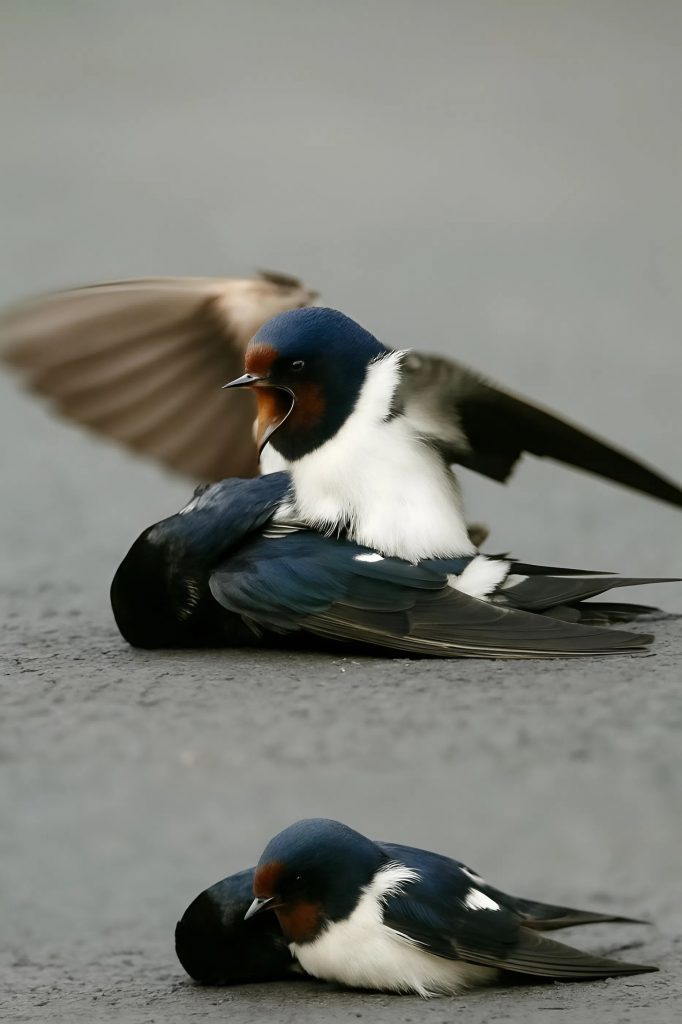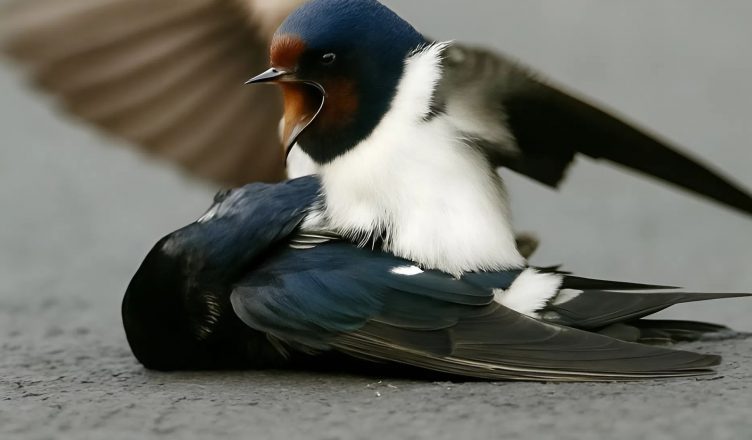Stories about animals often touch us more deeply than we anticipate—especially when they reveal emotions we tend to think of as uniquely human. What happened on a quiet provincial road stunned passersby and left one witness, Sergey Nikolaevich Orlov, completely speechless. It was not just an accident on the asphalt, but a heartbreaking scene that forced everyone who saw it to reconsider the very nature of loyalty and love.
The Sudden Accident
It was a clear morning. Traffic moved steadily, and swallows darted across the sky in playful swoops as they hunted insects. One swallow, perhaps distracted in its flight, dove too close to the ground and was struck by a passing car. The impact was instant. The small bird collapsed on the road, motionless.
Drivers carried on, unaware of what had just happened. A life had ended in silence, unnoticed—until something extraordinary occurred that brought the whole street to a standstill.
A Mate Who Refused to Leave
Moments later, another swallow descended rapidly. It was the fallen bird’s mate. Instead of flying away in fear of the cars, it landed beside the injured body. Witnesses expected it to leave, but it didn’t.
The bird bent down repeatedly, pecking at its companion as if trying to wake it. It chirped in short, trembling notes—calls that seemed to carry desperation and sorrow. Every attempt was a plea for life.
By now, people had slowed their cars, stepping out to watch. A hush fell over the small crowd gathering. They could not believe what they were seeing: not a mere instinctive reaction, but something that looked uncannily like grief.
Pain Reflected in the Eyes of a Bird
“Animals are capable of many things,” said Sergey Orlov later, his voice still trembling, “but never in my life did I think I’d see something like this. That swallow was mourning.”

The bird did not leave the body. When someone cautiously approached to move it off the road, the swallow flew up sharply, circling, then dropped back down to shield it. It was as if it had taken on the role of protector, unwilling to let the last traces of its partner be disturbed.
A Cry That Shook Everyone
For long minutes the little swallow continued its ritual: nudging, calling, returning again and again. At last, as though it finally understood the finality of death, it let out a long, piercing cry that seemed to slice the silence in half.
Those who stood nearby would later say they had never heard a sound like it—more than just birdsong, it was a lament. And then, the bird stayed still, its small body pressed close to the lifeless one, unwilling to abandon its mate.
A Lesson in Loyalty
The story quickly spread beyond that quiet road. Some argued it was instinct, others claimed it was an example of animal bonding. Yet for the witnesses, the explanation hardly mattered. What they saw was real emotion—grief, loyalty, and love expressed by a creature so small and fragile.
In a world where people often forget the value of connection, a swallow gave a silent but unforgettable lesson. It showed that devotion and loss are not limited to humans; they are universal truths that resonate across species.
The Memory That Lingers
To this day, Sergey Orlov cannot recall the event without emotion. “I’ve seen many animals in my life,” he says, “but that moment changed the way I look at them forever.” Each time he sees swallows darting through the air, he remembers that morning—the car, the fall, and above all, the cry of a bird refusing to let go.
Perhaps science will continue to debate whether it was instinct or true emotion. But what remains undeniable is the power of that scene. A small swallow, loyal until the very end, left an impression that no one present will ever forget.
A Scene That Haunts the Heart
The world moves too fast, and we rarely stop to notice the small lives around us. But sometimes, a single fleeting moment is enough to remind us of what truly matters. On that road, one swallow showed that love and loss are not bound by words, reason, or human understanding.
It was not just a bird on the asphalt. It was a story of loyalty beyond death. And it left everyone who saw it asking: if such a tiny creature can show such devotion, are we—humans—always capable of the same?
